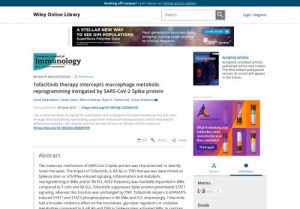ABSTRACT
The molecular mechanism of SARS-CoV-2 Spike-protein was characterized, to identify novel therapies. The impact of Tofacitinib, IL-6R Ab or TNFi therapy was determined on Spike-protein or LPS/IFNγ-induced signaling, inflammation and metabolic reprogramming in MΦs and/or RA FLS. ACE2 frequency was markedly expanded in MΦs compared to T-cells and RA FLS. Tofacitinib suppresses Spike-protein potentiated STAT1 signaling, whereas this function was unchanged by TNFi. Tofacitinib impairs IL-6/IFN/LPS-induced STAT1 and STAT3 phosphorylation in RA MΦs and FLS. Interestingly, Tofacitinib had a broader inhibitory effect on the monokines, glycolytic regulators or oxidative metabolites compared to IL-6R Ab and TNFi in Spike-protein activated MΦs. In contrast, all 3 therapies disrupted IFNα and IFNβ secretion in response to Spike-protein, nonetheless, the IFNγ was only curtailed by Tofacitinib or IL-6R Ab. While Tofacitinib counteracted MΦ metabolic rewiring instigated by Spike-protein, it was inconsequential on the glycolysis expansion mediated via HK2 and/or LDHA in the activated RA MΦ and FLS. Nevertheless, the potentiated inflammatory response and the diminished oxidative phosphorylation modulated by Spike protein and/or LPS/IFNγ stimulation in MΦs or RA FLS; were reversed by Tofacitinib. In conclusion, Tofacitinib suppresses MΦ inflammation and immunometabolism triggered by Spike protein and may provide a promising strategy for COVID-19 patients.








